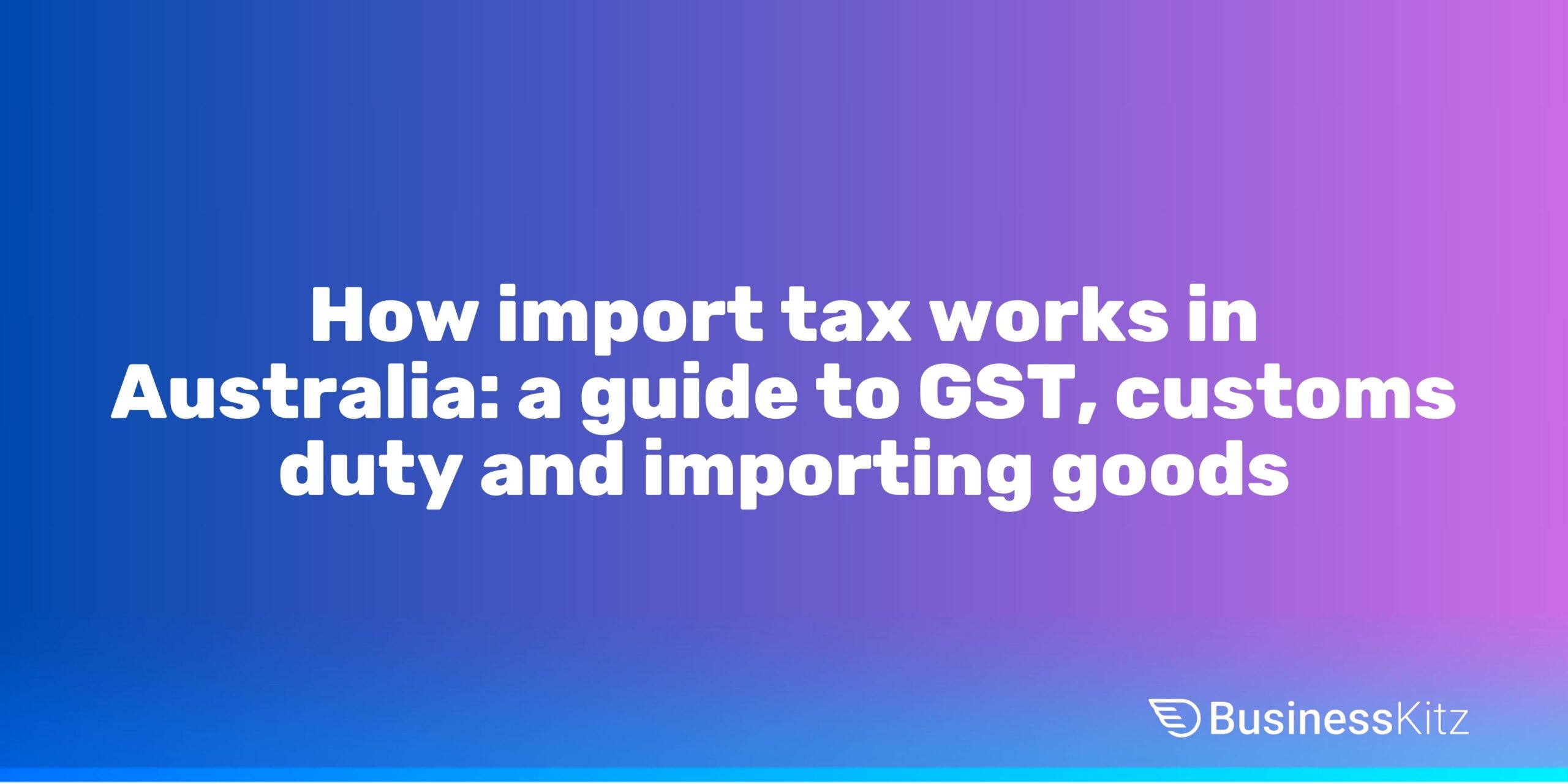
We've helped businesses save $55m with our all-in-one platform. Get instant access to this template and 115+ others, plus AI-powered document creation, starting completely free.
Importing goods into Australia comes with costs, including import tax, GST and customs duty. Some imported goods qualify for duty concessions or GST exemptions. Understanding tax rules helps businesses and individuals budget, comply with laws and avoid unexpected charges.[ez-toc]
Import tax includes GST, customs duty and other charges on imported goods. The tax amount depends on the customs value, country of origin and product type. Duty concessions or GST exemptions may be available for some goods, and businesses may be able to claim a GST credit or defer the payment of GST where GST is payable. Understanding importation rules helps avoid delays and extra costs.
Understanding import tax is crucial for anyone bringing goods into Australia. The responsibility for paying these taxes depends on the type of importer and the purpose of the import.
The Australian government applies import tax to businesses and individuals who import goods. These include:
Each group has different tax obligations, depending on the value of the goods and whether they are used for business or personal purposes.
Businesses
Personal online shoppers
Dropshipping and third-party fulfilment
If you are starting up your business and want to engage a company to manufacture your product, utilise Business KitzManufacturing Agreement Template to help get you started.
Importer typeGST payableCustoms dutyImport declaration required?BusinessYesNo, if under AUD $1,000Yes, if over AUD $1,000Personal buyerYesNo, if under AUD $1,000Yes, if over AUD $1,000DropshipperVariesDepends on the country of originMay be requiredBusinesses and individuals should check import rules before ordering from a foreign country. They must also ensure goods meet certain safety standards. Understanding these responsibilities helps avoid delays and unexpected charges.

When businesses and individuals import goods into Australia, they must pay import tax and duties. These costs depend on the type of goods, their country of origin and their value. Importers should understand these charges to budget correctly and avoid unexpected costs.
Customs duty applies to many imported items. The duty rate depends on:
Importers may be able to access duty concessions on some goods. These concessions reduce or remove customs duty if the goods meet certain criteria.
GST applies to most imported items at a rate of 10%. The tax is calculated on:
Businesses that are registered for GST may be able to claim a GST credit. Some businesses defer the payment of GST using the deferred GST scheme.
Some goods are subject to extra taxes, including but not limited to:
Product categoryCustoms dutyGSTAdditional taxesGeneral goodsVaries10%NoneElectronicsVaries10%NoneClothing and footwear5%10%NoneCars over LCT limit5%10%LCT appliesWine5%10%WET appliesImporters should check tax rates, tariff classifications and duty concessions before finalising purchases as the percentages listed above can vary depending on multiple factors such as the country of origin. This helps them manage costs and comply with Australian import laws.
When businesses and individuals import goods into Australia, they must pay GST on most items. The Australian Taxation Office collects this tax before releasing the goods. Understanding how GST is calculated helps importers budget for total costs and avoid unexpected fees.
The GST amount is based on the customs value of the goods plus any additional costs. The formula for calculating GST is:GST = 10% of (Customs Value + Customs Duty + Shipping + Insurance)
An importer brings in a shipment of electronics from a foreign country. The cost breakdown is:Cost componentAmount (AUD)Customs value$5,000Customs duty (5%)$250Shipping & insurance$500GST taxable amount$5,750GST (10%)$575The total payable amount for GST in this example is $575. If the importer is registered for GST, they may be able to claim a GST credit on this amount in their business activity statement. Some businesses defer the payment of GST using the deferred GST scheme, which includes details of deferred GST in their tax reporting.Understanding GST calculations helps importers plan costs and meet tax obligations when goods are sent to Australia.

Not all imported goods are subject to full import tax and duties. Some goods qualify for GST exemptions or duty concessions, reducing costs for importers. Businesses can also claim a GST credit to offset tax payments on commercial imports.
Certain goods are not subject to GST when imported, including:
Importers must check if their imported goods meet Australian tax laws for GST exemptions. Goods must match specific design or nature criteria to qualify.
Australia has Free Trade Agreements (FTAs) with several countries. These agreements allow certain imported goods to enter Australia with reduced or no customs duty. Duty-free status depends on:
Importers may be able to access these duty concessions by providing the correct documentation during customs formalities.
Businesses registered for GST can claim a GST credit for tax paid on imported goods. To do this, they must:
Some businesses also defer the payment of GST through the deferred GST scheme. This allows them to report and pay GST later instead of at the border.Importers should check tax laws carefully to ensure they claim exemptions and credits correctly. They must also hold relevant documentation to prove their eligibility for these benefits.Securely store important documentation in Business Kitz Document vault, and streamline your business process with over 100 document and agreement templates to help get you started. Sign up today!
Low-value imported goods (under AUD $1,000) follow different tax rules than higher-value shipments. The Australian Taxation Office applies GST to most of these goods, but customs duty does not apply. Importers should understand how GST is collected and how major online platforms handle tax at checkout.
For goods valued at less than AUD $1,000, the tax treatment includes:
The seller or marketplace usually collects GST at the time of purchase, reducing delays when goods are sent to Australia.
Overseas businesses must collect GST if they:
These businesses must show GST and total payable amount on the receipt. If payment is required but not collected at checkout, buyers may have to pay GST before delivery.
Marketplaces like Amazon and eBay manage GST for sellers. When buying from these platforms:
Buyers should check tax details before completing a purchase. Understanding importation rules helps avoid extra charges when goods have been imported.
Importers must follow strict rules when bringing goods into Australia. Mistakes in customs formalities can lead to delays, fines or extra taxes. Knowing the compliance rules helps importers avoid penalties and speed up clearance.
Importers must submit an import declaration for goods over AUD $1,000. This document provides details of values and other key information. It must include:
Goods must be classified under the correct tariff codes. These codes determine customs duty rates and whether the goods are subject to extra taxes like excise tax or luxury car tax (LCT).
Errors in importation paperwork can lead to:
If goods arrive without the right permits, importers need a permit before they can clear customs.
A licensed customs broker can assist importers by:
Working with a broker reduces errors and ensures imports meet certain criteria before arrival. Proper planning helps businesses avoid penalties and keep supply chains moving.

Importers can lower costs by using legal import tax reduction methods. These include Free Trade Agreements (FTAs), duty deferral programs and GST credit schemes. Bulk importers can also use special strategies to save on tax and logistics.
Australia has Free Trade Agreements with many countries. These agreements reduce or remove customs duty on certain imported goods. To qualify, importers must:
Importers may be able to benefit from these agreements by checking duty rates before purchasing.
Businesses can delay tax payments through special programs. These include:
Businesses that import goods in large volumes can reduce costs by:
Planning shipments and using government of Australia programs can help businesses lower importation costs and improve cash flow.
Businesses, consumers and online shoppers must pay import tax when bringing goods into Australia. If goods are worth more than AUD $1,000, importers must submit an import declaration with details of values and charges. The assessment of GST, customs formalities or misclassifications can affect total costs.
The GST you pay is 10% of the total taxable amount, which includes the customs value, charges for the imported goods, shipping and insurance. Some businesses use the deferred GST and total payable reporting option to delay tax payments.
Would customs duty apply? It depends on the product type and country of origin. Some imported items qualify for reduced or zero customs duty under Free Trade Agreements. Businesses should check the details of values and charges before importing.
Yes, businesses eligible to participate in the deferred GST and total payable scheme can delay GST payments until they submit their tax statement. This payment deferral can improve cash flow for importers.
If goods have arrived in Australia without the correct paperwork, customs may hold or return them. Importers must ensure they have completed the customs formalities to avoid fines.
Yes, Australia’s indirect tax zone affects certain imports. Depending on where the transaction occurs, some sales of goods may be exempt.
Understanding import tax helps businesses and individuals plan costs and avoid delays. Importers must pay GST, customs duty and other taxes depending on the value of the goods and their country of origin. Some imported goods qualify for duty concessions or GST exemptions. Businesses may be able to claim a GST credit or defer the payment of GST to improve cash flow.Staying informed about importation rules improves compliance and helps prevent penalties. Importers should check tariff classifications, submit an accurate import declaration and follow customs formalities. Working with a licensed customs broker can help navigate tax laws and reduce errors.For reliable document management in international trade, use Business Kitz. Our platform simplifies document management so you can focus on growing your business, offering over 100 document and agreement templates, secure document storage, simplified document e-signing and many more features. Sign up for free today!Disclaimer: This content is intended to be used for educational and informational purposes only. Business Kitz does not offer legal advice and cannot guarantee the accuracy, reliability, or suitability of its website content for a particular purpose. We encourage you to seek professional advice from a licensed professional and verify statements before relying on them. We are not responsible for any legal actions or decisions made based on the information provided on our website.Unless expressly stated otherwise, all content, materials, text, images, videos and other media on this website and its contents are the property of their respective copyright owners.
Copyright © 2025 Business Kitz 14312161